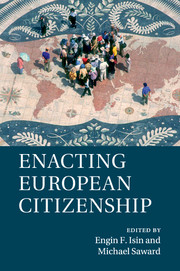11 results
Preface
-
-
- Book:
- Enacting European Citizenship
- Published online:
- 05 May 2013
- Print publication:
- 18 April 2013, pp ix-x
-
- Chapter
- Export citation
Index
-
- Book:
- Enacting European Citizenship
- Published online:
- 05 May 2013
- Print publication:
- 18 April 2013, pp 238-241
-
- Chapter
- Export citation
1 - Questions of European citizenship
-
-
- Book:
- Enacting European Citizenship
- Published online:
- 05 May 2013
- Print publication:
- 18 April 2013, pp 1-18
-
- Chapter
- Export citation
Enacting European Citizenship - Half title page
-
- Book:
- Enacting European Citizenship
- Published online:
- 05 May 2013
- Print publication:
- 18 April 2013, pp i-ii
-
- Chapter
- Export citation
Copyright page
-
- Book:
- Enacting European Citizenship
- Published online:
- 05 May 2013
- Print publication:
- 18 April 2013, pp iv-iv
-
- Chapter
- Export citation
Enacting European Citizenship - Title page
-
-
- Book:
- Enacting European Citizenship
- Published online:
- 05 May 2013
- Print publication:
- 18 April 2013, pp iii-iii
-
- Chapter
- Export citation
Contents
-
- Book:
- Enacting European Citizenship
- Published online:
- 05 May 2013
- Print publication:
- 18 April 2013, pp v-vi
-
- Chapter
- Export citation
Contributors
-
-
- Book:
- Enacting European Citizenship
- Published online:
- 05 May 2013
- Print publication:
- 18 April 2013, pp vii-viii
-
- Chapter
- Export citation
2 - Claiming European citizenship
-
-
- Book:
- Enacting European Citizenship
- Published online:
- 05 May 2013
- Print publication:
- 18 April 2013, pp 19-46
-
- Chapter
- Export citation

Enacting European Citizenship
-
- Published online:
- 05 May 2013
- Print publication:
- 18 April 2013
The Divided City: Forgetting in the Memory of Athens. By Nicole Loraux. Translated by C. Pache and J. Fort. New York: Zone Books, 2002. 360p. $30.00
-
- Journal:
- Perspectives on Politics / Volume 1 / Issue 2 / June 2003
- Published online by Cambridge University Press:
- 27 August 2003, p. 391
- Print publication:
- June 2003
-
- Article
- Export citation



